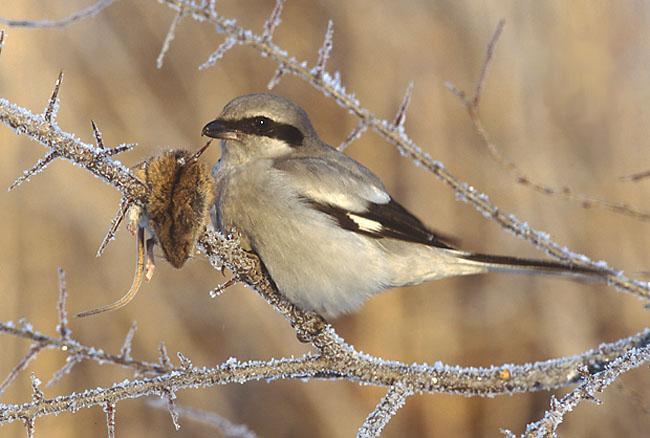Guide to Boreal Birds
Overview
A predatory songbird, the Northern Shrike sits quietly, often in the top of a tree, before swooping down after insects, mice, and small birds. It kills more than it can eat, impaling the prey on a thorn or wedging it in a forked twig. On lean days it feeds from its larder. Like other northern birds that depend on rodent populations, the Northern Shrike's movements are cyclical, becoming more abundant in the United States when northern rodent populations are low. Sometimes they hunt from an open perch, where they sit motionless until prey appears; at other times, they hover in the air, ready to pounce on anything that moves. The Northern Shrike breeds in open deciduous or coniferous woodland, taiga, thickets, bogs, and scrub. Populations are probably stable, but forest regeneration, urbanization, and intensive farming, which now dominate many landscapes once favored by shrikes, will probably cause local declines.
Description
9-10 1/2" (23-27 cm). Robin-sized. Pale gray above, white below, with faint barring on underparts, and bold black mask ending at bill. Black tail with white edges. Stout, hooked bill. Immature is browner. Usually seen perched atop a tree in the open. Loggerhead Shrike is shorter-billed, with black mask that crosses forehead.
Voice
Mixture of warbles and harsh tones with a robin-like quality.
Nesting
4-6 pale gray eggs, spotted with dark gray and brown. Nest a large mass of twigs, lichens, moss, and feathers, usually in a dense conifer.
Habitat
Open woodlands and brushy swamps in summer; open grasslands with fence posts and scattered trees in winter.
Range/Migration
Breeds from Alaska across northern Canada to Labrador, south to northern British Columbia. Winters irregularly across northern tier of states south to northern California, Kansas, and Pennsylvania. Also in Old World.



